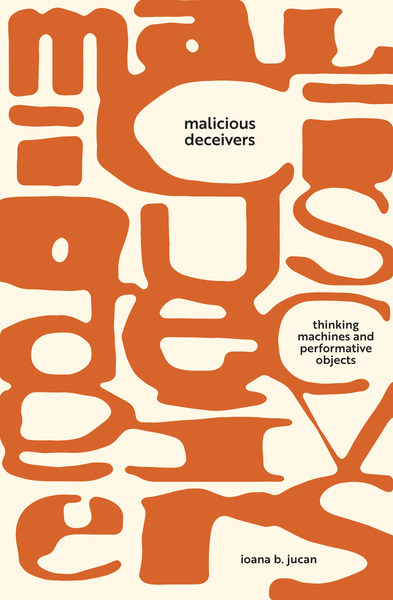Jucan Discusses ‘Malicious Deceivers’ in New Book Examining Post-Truth

Malicious Deceivers: Thinking Machines and Performative Objects (Stanford University Press) is Assistant Professor Ioana Jucan’s new book that explores post-truth and its connection to René Descartes’ metaphysics and global capitalism, and the fakeness embedded in software and AI, television, plastics, and the internet.
Jucan, who teaches in the Marlboro Institute for Liberal Arts and Interdisciplinary Studies, spoke with Emerson Today about the book.
This is a condensed and edited version of the conversation.
Q: Why did you write Malicious Deceivers?
Jucan: I was working on this project when the notion of post-truth had gained a lot of currency, particularly in the context of the “fake news” media environment.
In 2016, Oxford Dictionaries proclaimed “post-truth” as the word of the year. I felt this concept was both intriguing and problematic. Oxford Dictionaries defined it as “relating to or denoting circumstances in which objective facts are less influential in shaping public opinion than appeals to emotion and personal belief.” This definition was picked up by the mainstream media. Like other scholars, I felt that this definition was problematic, not only because it seems to imply that there was a time when truth (“objective facts”) dominated and that there is such a thing as objectivity that is uncontested, but also because the realities we are given to inhabit are “post-truth” in a much deeper way than this definition suggests.
I embarked on this book project in an attempt to understand why we are living in a reality or a system that feels like it is built on, and reproduces fakeness – where fakeness is part of its mode of operation.I had this feeling when I was growing up in Romania, in the aftermath of the contested, televised Romanian Revolution, and during the transition period from communism to capitalism, and I continued to have this feeling when I came to the United States (though, of course, there were important differences).
In the book, I unpack the notion of fakeness in terms of what I call the “logics of (dis)simulation” — the conjoining of dissimulation (deception) and simulation (performativity) — through case-studies that take place in different geographic locations, including the Romanian and U.S. contexts. On the positive side, I was interested in ways to counter the logic of (dis)simulation and, in the book, I explore artistic works that do this.
Q: Is it important to declare when post-truth was created or defined?
Jucan: “Post-truth” — and, relatedly, the notion of “fake news” — gained prominence in the context of the 2016 presidential election [in the U.S]. But various scholars and thinkers have been thinking about fakeness built into reality for a much longer time. I don’t know if it’s important — or even possible — to exactly pinpoint when “post-truth” starts, but I do think it is important to recognize that there is a much longer history to it.
In my book, I trace a genealogy of “post-truth” that goes back to Descartes’s metaphysics and its connections to Western modernity, capitalism, and computation. It is connected to an abstracting way of thinking and relating to the world, which becomes embedded in what I call in the book “(dis)simulation machines and performative objects” – namely: software and AI, television, plastics, and the internet.

Q: Your book connects the production of repeatable fakeness with capitalism and Cartesian metaphysics. What is repeatable fakeness?
Jucan: Repeatable fakeness is an effect of the logic of (dis)simulation and the voiding (hollowing out, as well as rendering void) that is associated with this logic. Let me elaborate on this by turning to Descartes and his scenario of the malicious deceiver (also known as the “evil demon”), where the title of my book comes from.
René Descartes is a 17th-century French philosopher whose metaphysics and epistemology have been widely influential. Metaphysics studies the fundamental nature of reality. Descartes’s metaphysics provides a problematic and enduring picture of the world and the self that relies on abstraction.
The scenario of the malicious deceiver is a device through which Descartes establishes this picture of the world. This scenario is part of an experiment of radical doubt, on which Descartes embarks in order to distinguish the true from the false, the real from the fake, and to find what it is that we can know with certainty, beyond all doubt. Early on in this experiment, Descartes says that the senses and lived experience sometimes deceive and thus, are unreliable. This is, of course, a problematic move. He then goes on to imagine an omnipotent malicious deceiver that is feeding him all his thoughts.
This is an early version of the computer simulation scenario that we find in The Matrix, where computers are feeding us all of our thoughts. This scenario is difficult to believe, so Descartes actually says he needs to deceive himself into believing in it for some time. While trying to escape deception, Descartes in fact builds it into his metaphysics as its very condition.
So, if this scenario is true, then what can we know and what is true? Descartes says that, even if this scenario were true, he still knows that there is an “I” that is thinking. Not only that, but that the essence of this “I” is that it is a thinking thing. However, this is an impoverished “I,” a mind separated from the body and totally voided of its histories, and lived experience.
Then Descartes turns to the world, to material things, and says that they exist not as we perceive them with our senses, with their varied qualities, but only as they can be represented mathematically. At play here is simulation, a modeling of the world through, and in the image of, mathematics. This picture of the world, which Descartes also refers to as “the world as if it were a machine,” is deeply problematic. It is an abstraction; it voids the world of diversity, histories, and lived experience, and in so doing, it propagates and reproduces sameness.
An author I draw from, Santiago Castro-Gómez, calls this voiding “zero-point hubris.” He ties it to colonialism, where a world is voided and remade by force, as well as to claims to objectivity and universal validity. In the book, I tie it to global capitalism, which depends on mathematics, numerical thinking, and quantification, and which – together with its ideological counterpart, consumerism – has brought about a particular kind of repeatable sameness across the globe. Consider, for example, the way in which everything is rendered equivalent when it is reduced to a commodity for sale, or the widespread mindset bent on profit-generation at all costs that treats human and non-human beings and things as resources to be exploited, or the worldwide plastic pollution that is a result of consumerist habits.
Q: In the book you show how “(dis)simulation machines and performative objects construct impoverished pictures of the world, ensuring a repeatable sameness through processes of hollowing out embodied histories and lived experience.” What are specific (dis)simulation machines and performative objects?
Jucan: The specific (dis)simulation machines and performative objects I investigate in the book are software and AI, television, plastics, and the internet. Building on the analysis of the scenario of the malicious deceiver in Descartes from the first chapter of the book, in the remaining chapters I use the malicious deceiver as both a metaphor for Cartesian metaphysics and as a frame to analyze the deceptive performances of these machines and objects.
In the interest of time, let me just take up synthetic plastics here. In the book, I argue that synthetic plastics are material products of Cartesian metaphysics and show how they embody the logics of (dis)simulation. Derived from fossil fuels and created through engineering at the molecular level, synthetic plastics are an excellent medium for simulation. They imitate and substitute themselves for natural materials. This process relies on abstraction.
Take nylon, for example. Nylon was one of the first synthetic fibers. It was built to imitate silk, and to ultimately displace it to create something more durable. In Romania, growing up, we had a huge influx of plastic plates and cups. The idea was that plastic is much better than glass because it does not break. Plastics imitate materials that are already in nature, but then replaces them with something that is anti-nature. Being non-biodegradable, it takes ages for them to disappear. And they are very toxic and harmful to the environment.
In the book, I write that synthetic plastics are a kind of object-symbol for consumerism and for the mindset of disposability. They are both fascinating and deeply troubling because in a sense they’re the material substance of the world today, and they ensure a kind of repeatable sameness. They are everywhere, from the huge plastic gyres in the oceans to the micro- and nano-plastics in the air and water. They are also the material for the credit card and, increasingly, for money.
Q: What was the goal of your book?
Jucan: The book aims to shed light on how fakeness operates and how it structures reality, why, and with what consequences. On the positive side, the book seeks alternative ways of world-making that are more capacious, caring, and careful and that honor embodied, lived experience and histories.
Q: What would be the one thing you’d want a reader to take away from your book?
Jucan: There’s a particular experience I want the reader to have and take away. The book sits in the tradition of writing as performance, and I approached writing the book like a theatre director who constructs a world on stage. It’s about experiencing a world I put together, alongside the intellectual engagement with the ideas that the book puts forth.
I also hope that the book provokes critical reflection. I would like readers to ask, ‘What’s my role in all this that’s been described in the book? Am I perpetuating the problem? Is there a way I can improve my practice of living?’
Q: Have you improved your practice of living?
Jucan: Writing the book was a long process, and a personal project. During this journey, I believe there are ways in which I have grown, for instance, by giving greater attention to how my own social location has informed my thinking.
I have also strived to cultivate a living practice of refusing and pushing against abstracting ways of thinking that reduce the richness and manifoldness of the world and of embodied, lived experience.
Categories